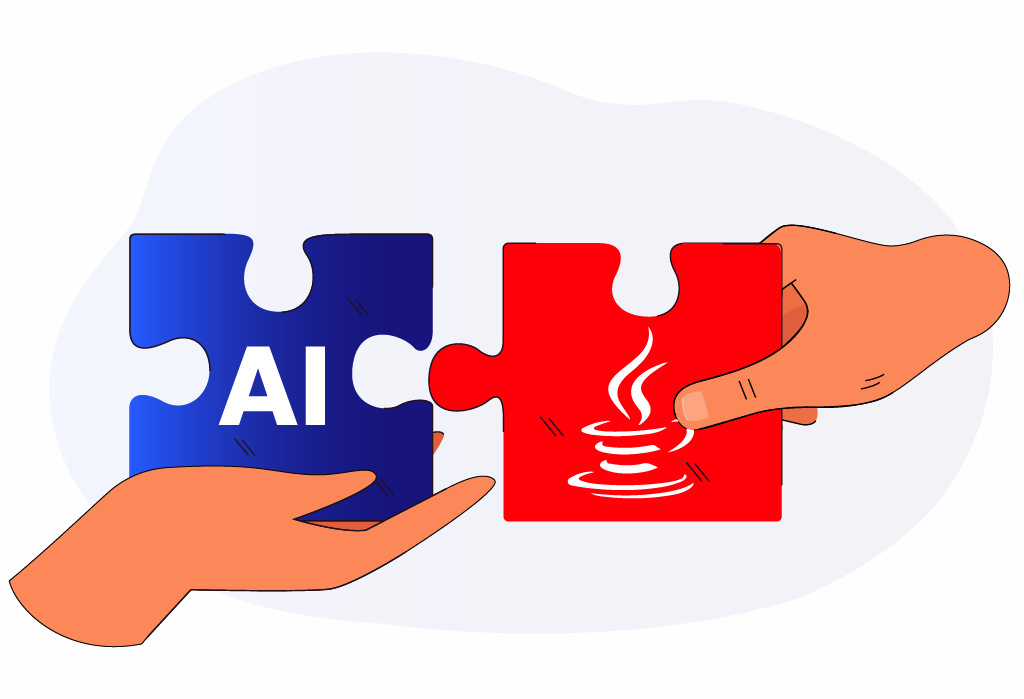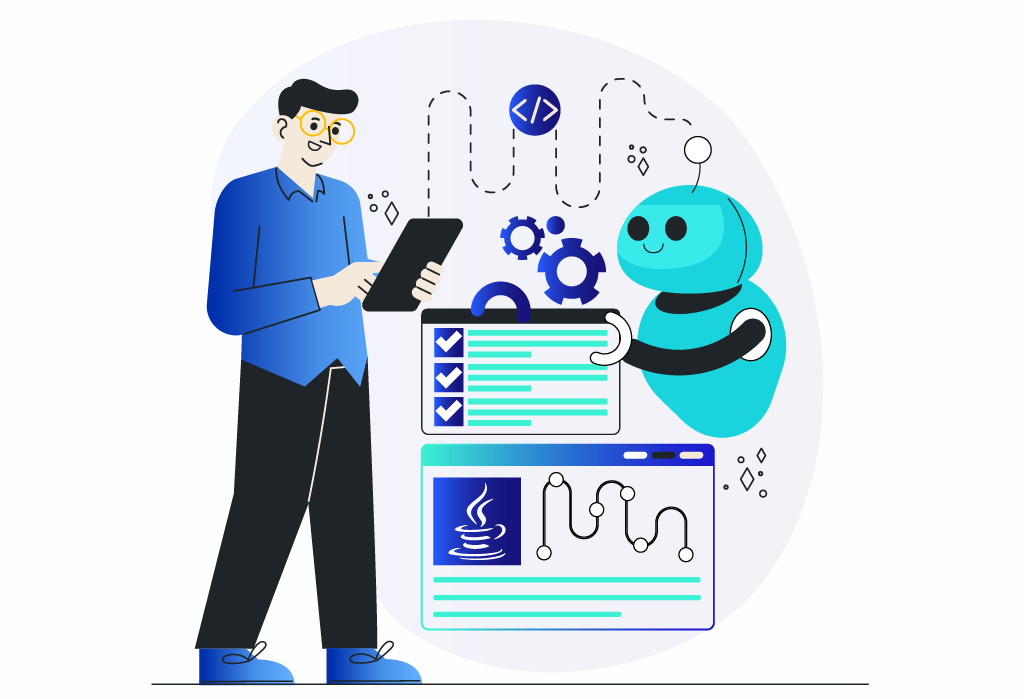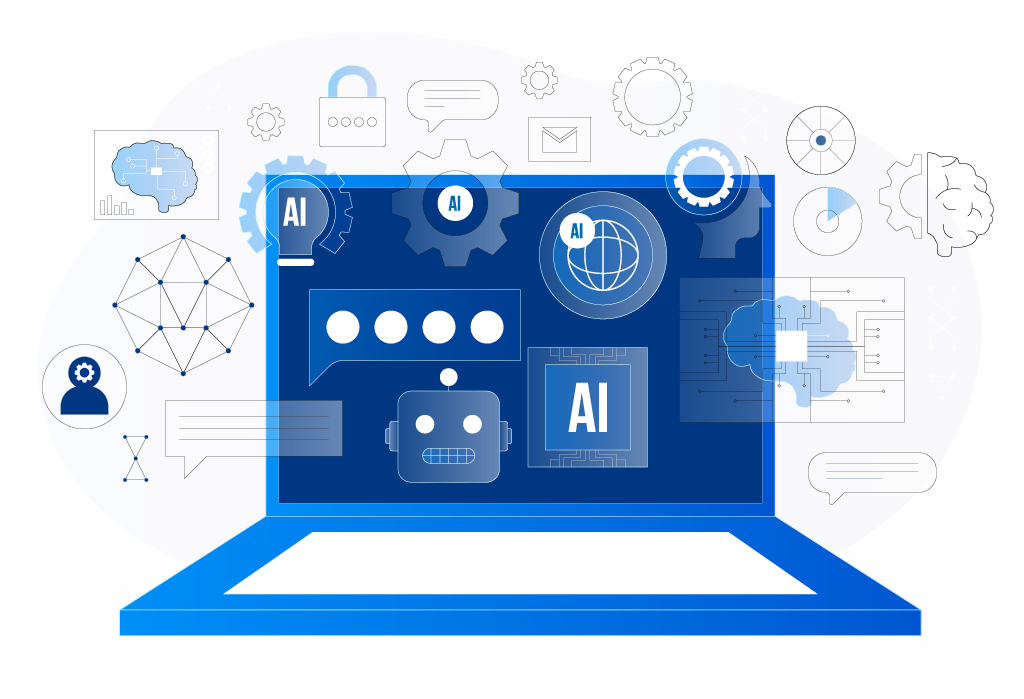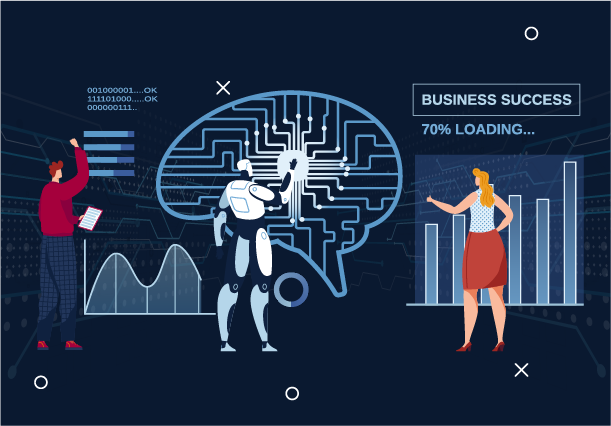Forging Tomorrow’s Technology: Merging AI and Java for Innovation and Excellence
In the midst of the technological whirlwind, the combination of artificial intelligence and Java programming offer a previously unheard-of chance for innovation and progress. This dynamic combination of Java and AI has the potential to completely transform a number of industries, including e-commerce, healthcare, and finance. Java’s stability and adaptability provide a strong platform for creating scalable, effective, and intelligent applications, which is particularly useful as businesses want to leverage AI to promote intelligent decision-making and automation.
Numerous opportunities arise when AI is integrated with Java, including computer vision, machine learning, natural language processing, and predictive analytics. Developers may construct sophisticated applications that meet a variety of user needs by combining Java’s flexibility and cross-platform compatibility with AI’s capacity to analyze massive volumes of data and derive actionable insights.
Furthermore, the future of software development will be significantly impacted by the combination of Artificial Intelligence with Java. Leveraging AI-driven solutions within Java applications helps enterprises stay ahead of the curve in a competitive market setting by improving productivity, streamlining workflows, and providing individualized user experiences. The possibilities are practically limitless, ranging from recommendation engines and intelligent chatbots to autonomous systems and predictive maintenance.
Leveraging AI-driven solutions within Java applications helps enterprises stay ahead of the curve in a competitive market setting by improving productivity, streamlining workflows, and providing individualized user experiences. The possibilities are practically limitless, ranging from recommendation engines and intelligent chatbots to autonomous systems and predictive maintenance.
Understanding Java’s integration with AI is meant to reveal novel approaches and game-changing potential that result from this partnership. Businesses can seize new chances for expansion, productivity, and creativity by comprehending the core ideas, salient characteristics, and practical implementations of AI in Java programming. With the help of this investigation, we hope to enable businesses to seize the opportunities presented by emerging technologies and use Java and AI integration to improve their operations and services.
Core Concepts, Features, and Java Integration Benefits with AI Fundamentals
Knowing the basic ideas behind artificial intelligence (AI) is crucial in the current tech revolution. Artificial Intelligence (AI) comprises a broad spectrum of concepts and methods designed to allow machines to mimic human intelligence. Artificial Intelligence (AI) has a wide range of applications that are changing businesses all over the world, from natural language processing to machine learning algorithms.
When AI is combined with Java, a powerful and flexible programming language, it opens up new possibilities and improves the functionality of Java-based apps. With the help of this combination, developers can now easily utilize AI’s sophisticated algorithms and functions within Java frameworks to create smart, data-driven solutions.
The combined use of AI with Java differs from conventional development methods in a few keyways. Among these capabilities are advanced machine learning frameworks, like PyTorch and TensorFlow, which make it easier to integrate intricate AI models into Java applications. Furthermore, Java’s capabilities are enhanced by AI-powered tools for pattern recognition and data analysis, which let programmers create adaptive and predictive systems.
Among these capabilities are advanced machine learning frameworks, like PyTorch and TensorFlow, which make it easier to integrate intricate AI models into Java applications. Furthermore, Java’s capabilities are enhanced by AI-powered tools for pattern recognition and data analysis, which let programmers create adaptive and predictive systems.
There are numerous benefits of integrating AI with Java. First of all, it makes it possible to create intelligent apps that can analyze data, learn from it, and make deft judgments on their own. This is especially helpful in industries where tailored recommendations and predictive analytics are key to success, like finance, healthcare, and e-commerce.
Frameworks, Implementation, and Business Applications of Java and AI
When it comes to the integration of AI for Java, many frameworks are essential for the smooth creation and implementation of intelligent applications. In addition to offering strong libraries and tools for implementing AI, these frameworks have a number of important economic benefits.
Java includes multiple AI development-specific frameworks, each with special features and capabilities to meet a range of AI needs. These frameworks give programmers the resources and instruments they need to fully utilize artificial intelligence in Java-based applications. These frameworks enable developers to fully explore the promise of AI-driven solutions, ranging from deep learning platforms to machine learning libraries.
Deeplearning4j is a state-of-the-art deep learning library tailored for Java and JVM environments, and it serves as an excellent framework for integrating AI into Java applications. Developers can conveniently integrate deep learning models and neural networks, among other sophisticated AI methods, into their Java applications by using Deeplearning4j. This real-time example illustrates how AI capabilities may be practically implemented in Java projects, showcasing the adaptability and efficacy of AI frameworks in augmenting application functionality.
Companies can take use of cutting-edge AI technology to spur innovation and gain a competitive edge by integrating AI frameworks into Java applications, which has substantial business ramifications. Businesses can improve decision-making processes, automate procedures, obtain insightful knowledge from data, and improve user experiences by incorporating AI capabilities into Java-based systems. Furthermore, Java apps with AI capabilities can expedite time-to-market, optimize workflows, and increase operational efficiency, all of which can boost client happiness and company expansion.
Businesses can improve decision-making processes, automate procedures, obtain insightful knowledge from data, and improve user experiences by incorporating AI capabilities into Java-based systems. Furthermore, Java apps with AI capabilities can expedite time-to-market, optimize workflows, and increase operational efficiency, all of which can boost client happiness and company expansion.
The combination of AI and Java frameworks has the potential to revolutionize the software development industry by creating new avenues for innovation and promoting commercial success in an increasingly AI-driven environment. Realizing the full potential of intelligent software solutions will depend heavily on Java applications’ deliberate adoption of AI frameworks, as enterprises continue to embrace AI technology.
Harnessing AI for Enhanced User Experience and Performance with Java Applications
Artificial Intelligence (AI) using Java has become a disruptive force in the ever-changing field of software development, changing the way applications are designed and function. By combining these two potent technologies, Java programs can now accomplish much more, and they also improve user experiences and operational efficiency.
Fundamentally, this synergy is about using the strong Java framework to leverage the fundamental AI concepts, enabling the development of data-driven, intelligent, and adaptive systems. Developers can access a wide range of features and functions that were previously unachievable by integrating AI capabilities into Java programs. These comprise, among other things, computer vision, natural language processing, sophisticated machine learning algorithms, and predictive analytics.
Artificial Intelligence (AI) using Java has become a disruptive force in the ever-changing field of software development, changing the way applications are designed and function. By combining these two potent technologies, Java programs can now accomplish much more, and they also improve user experiences and operational efficiency.
Fundamentally, this synergy is about using the strong Java framework to leverage the fundamental AI concepts, enabling the development of data-driven, intelligent, and adaptive systems. Developers can access a wide range of features and functions that were previously unachievable by integrating AI capabilities into Java programs. These comprise, among other things, computer vision, natural language processing, sophisticated machine learning algorithms, and predictive analytics.
Recommendation systems implemented in e-commerce platforms are a fascinating real-time example of Java AI integration. Artificial intelligence (AI) algorithms can provide tailored product recommendations by examining user behavior, preferences, and past purchases. This can greatly increase conversion rates and income production.
Tackling Challenges in AI and Java Integration; Navigating the Convergence
Combining Java with Artificial Intelligence (AI) opens up a world of possibilities for application development, but it also brings with it a number of difficulties that need to be properly resolved in order to get the best results. Organizations face a number of challenges including integration, security, and ethical issues when they set out on this transformative journey.
Security issues with AI-enabled Java applications are one of the main integration hurdles between AI and Java. It is crucial to protect against cybersecurity attacks since AI algorithms handle sensitive data, like private customer information and confidential company data. Strong security measures, such as access controls, threat detection systems, and encryption protocols, must be put in place by developers to protect AI-driven Java apps from possible hacks and breaches.
The smooth integration of artificial intelligence (AI) algorithms into Java programs is another major challenge. While AI has strong capabilities for decision-making and data analysis, it can be difficult and time-consuming to integrate these algorithms into current Java codebases. To guarantee seamless integration and interoperability between AI and Java components, developers must manage compatibility problems, API dependencies, and versioning conflicts. The integration process can be expedited and any difficulties can be reduced by utilizing modular design concepts and common integration frameworks.
The combination of AI programming and Java also brings up significant ethical and legal issues that businesses need to handle. Ensuring regulatory compliance with data privacy regulations and ethical guidelines becomes crucial as AI algorithms increasingly impact critical decision-making processes, such as credit scoring or healthcare diagnostics. In AI-driven Java apps, organizations must respect ethical values like fairness, transparency, and responsibility in addition to following legal requirements like GDPR, HIPAA, or industry-specific compliance standards.
Business entities may create AI-enabled Java apps that are morally sound, safe, and resilient by utilizing collaborative techniques, interdisciplinary knowledge, and best practices to navigate these obstacles. Organizations may fully realize the promise of integrating AI and Java by taking proactive measures to address security concerns, overcoming integration hurdles, and adhering to ethical and legal requirements. This will stimulate innovation and provide value to stakeholders.
Pioneering the Future with Pattem Digital; Synergizing Java and AI
Finally, before we wrap up our investigation into the integration of AI with Java, let’s review the many benefits that this partnership offers. Businesses can achieve unmatched efficiency, innovation, and performance improvements by utilizing AI-driven algorithms in Java applications. In addition to streamlining procedures, this synergy creates new opportunities and gives businesses the edge they need to remain competitive in today’s market.
Future developments in a variety of industries could be greatly impacted by the combination of AI with Java. The combination of these technologies promises to completely transform how companies run and interact with their clients, from tailored user experiences to predictive analytics. For businesses to stay relevant and promote long-term success in the digital age, organizations must adopt these emerging trends.
Being at the forefront of this technological revolution, we at Pattem Digital as an Artificial Intelligence Development company are creating cutting-edge solutions that fully utilize Java integration and AI. We can confidently manage the road ahead and maximize chances for our clients and partners because to our knowledge and dedication to excellence. Let’s work together to use AI and Java to shape the future of corporate technology as we set off on an innovative and transformative adventure.





